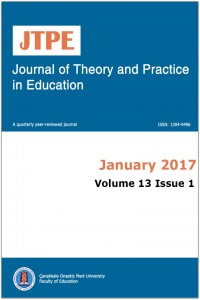Öz
The objective
of this study is to determine the metacognitive strategies that secondary
school students use before, during and after listening. In the research which
was designed as a case study of the qualitative research designs, interviews
were conducted with 24 students studying in six different schools located in
Yüreğir and Seyhan districts in Çukurova region. While determination of these
students, maximum variation sampling method from purposive sampling is used.
Datas are analyzed with Qualitative Analysis Programme Nvivo. At the end of the
research, it has been determined hat most of students use guess strategy before
listening, try to guess the content looking at the topic of the text, less
students use planning strategy than guess strategy. Moreover it was also
determined that there were students who did not use any strategy before
listening. It was observed that the following strategy was mostly used during
the listening process. After listening, it has been detected the whole students
have used strategies understanding evaluation, answer questions most about they
have listened and summarized text which they have listened. It has been stated
the least used strategy is evaluationing of achieving the goal.
Anahtar Kelimeler
Kaynakça
- Akyol, Hayati. (2006). Türkçe öğretim yöntemleri. Ankara: Kök Yayıncılık.
- Berman, Michail. (2003). Advanced listening, listening strategy guide. USA: DynEd International, Inc.
- Berne, Jane. E. (2004). Listening comprehension strategies: a review of the literature. Foreign Language Annals, 37 (4), 521-531.
- Birjandi, P., Mirhassani, A., & Abbasian, G. (2006). Setting-based metacognitive strategy use. Journal of Faculty of Letters and Humanities, 49 (198), 39-87.
- Bogdan, R., & Biklen, S. K. (1992) Qualitative research for education. Boston: Allyn and Bacon.
- Boyce, N. L., Van Tassel-Baska, B. J. D., Sher, B. T., & Johnson, D. T. (1997). A problem based curriculum: Parellel learning opportunities for students and teachers. Journal for the Education of the Gifted, 20 (4), 363–379.
- Burleson, B (2011). A constructivist approach to listening. International Journal of Listening, 25 (1), 27-46.
- Clark, L.H., & Starr, I.S. (1991). Secondary and middle school teaching methods. NY: MacMillan Publishing Co.
- Cohen J. (1960). A coefficient of agreement for nominal scales. Educational and Psychological Measurement, 20 (1), 37-46.
ORTAOKUL ÖĞRENCİLERİNİN DİNLEME BECERİSİNE YÖNELİK OLARAK KULLANDIKLARI ÜSTBİLİŞ STRATEJİLERİNİN BELİRLENMESİ
Öz
Bu araştırmanın amacı, ortaokul öğrencilerinin dinleme
öncesinde, dinleme sürecinde ve dinleme sonrasında kullandıkları üstbiliş
stratejilerini saptamaktır. Nitel araştırma desenlerinden durum çalışması
olarak desenlenen araştırmada Çukurova, Yüreğir ve Seyhan ilçelerinde bulunan,
altı farklı okulda öğrenim gören 24 öğrenciyle görüşmeler yapılmıştır. Söz konusu
öğrenciler belirlenirken amaçlı örnekleme yöntemlerinden maksimum çeşitlilik
örnekleme yöntemi kullanılmıştır. Elde edilen veriler NVivo Nitel Veri Analizi
Programı kullanılarak analiz edilmiştir. Araştırma sonucunda dinleme öncesinde
öğrencilerin çoğunun tahmin stratejisini kullandığı, tahmin stratejisine
yönelik olarak en çok dinleyecekleri metnin başlığına bakarak içeriği tahminde
bulunmaya çalıştıkları, planlama stratejisini ise tahmin stratejisine nazaran
daha az öğrencinin kullandığı saptanmıştır. Ayrıca dinleme öncesinde hiçbir
strateji kullanmayan öğrencilerin de bulunduğu tespit edilmiştir. Dinleme
sürecinde izleme stratejisinin daha çok kullanıldığı görülmüştür. Dinleme
sonrasında ise öğrencilerin tümünün anlamayı değerlendirmeye yönelik stratejiler
kullandığı, en çok dinledikleriyle ilgili soruları cevapladıkları ve
dinledikleri metni özetledikleri saptanmış, en az kullanılan stratejinin amaca
ulaşmayı değerlendirme olduğu tespit edilmiştir.
Anahtar Kelimeler
Kaynakça
- Akyol, Hayati. (2006). Türkçe öğretim yöntemleri. Ankara: Kök Yayıncılık.
- Berman, Michail. (2003). Advanced listening, listening strategy guide. USA: DynEd International, Inc.
- Berne, Jane. E. (2004). Listening comprehension strategies: a review of the literature. Foreign Language Annals, 37 (4), 521-531.
- Birjandi, P., Mirhassani, A., & Abbasian, G. (2006). Setting-based metacognitive strategy use. Journal of Faculty of Letters and Humanities, 49 (198), 39-87.
- Bogdan, R., & Biklen, S. K. (1992) Qualitative research for education. Boston: Allyn and Bacon.
- Boyce, N. L., Van Tassel-Baska, B. J. D., Sher, B. T., & Johnson, D. T. (1997). A problem based curriculum: Parellel learning opportunities for students and teachers. Journal for the Education of the Gifted, 20 (4), 363–379.
- Burleson, B (2011). A constructivist approach to listening. International Journal of Listening, 25 (1), 27-46.
- Clark, L.H., & Starr, I.S. (1991). Secondary and middle school teaching methods. NY: MacMillan Publishing Co.
- Cohen J. (1960). A coefficient of agreement for nominal scales. Educational and Psychological Measurement, 20 (1), 37-46.
Ayrıntılar
| Konular | Eğitim Üzerine Çalışmalar |
|---|---|
| Bölüm | Makaleler |
| Yazarlar | |
| Yayımlanma Tarihi | 31 Ocak 2017 |
| Gönderilme Tarihi | 21 Şubat 2017 |
| Yayımlandığı Sayı | Yıl 2017 Cilt: 13 Sayı: 1 |


